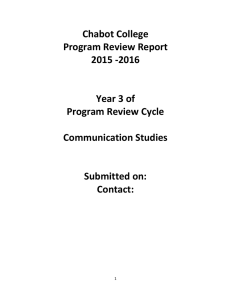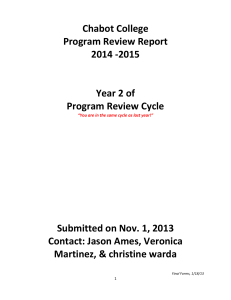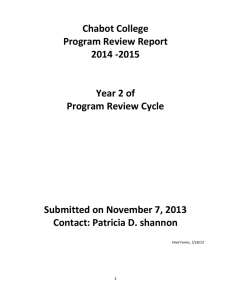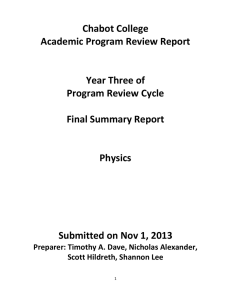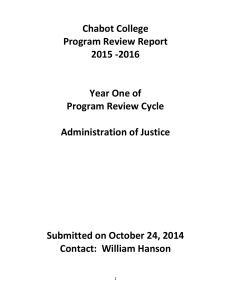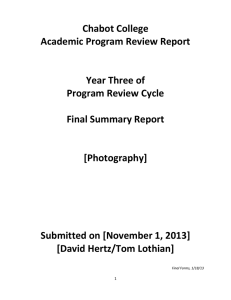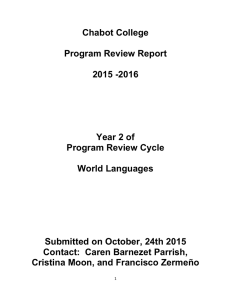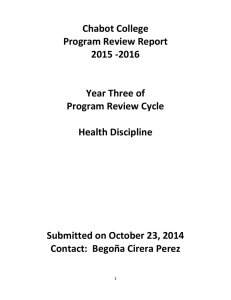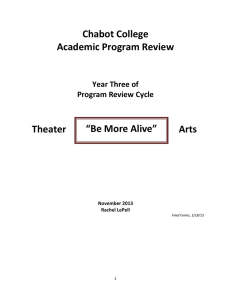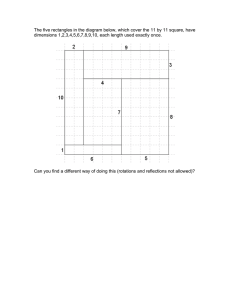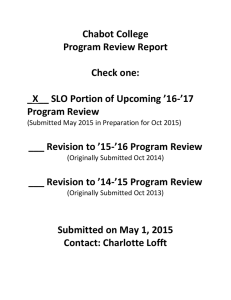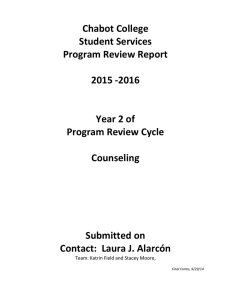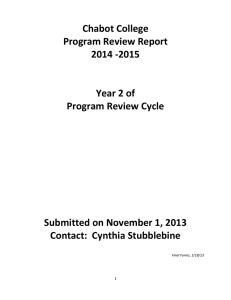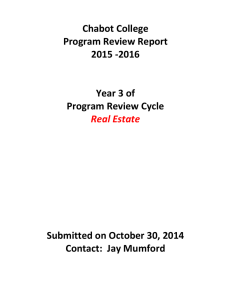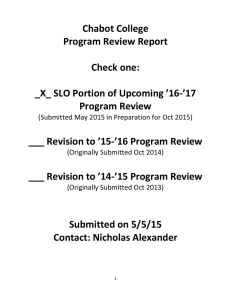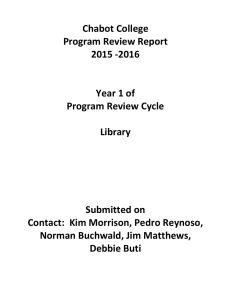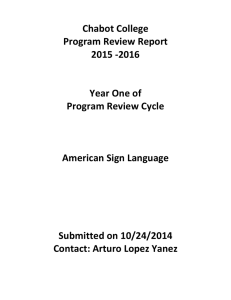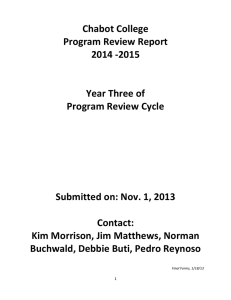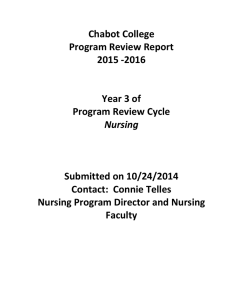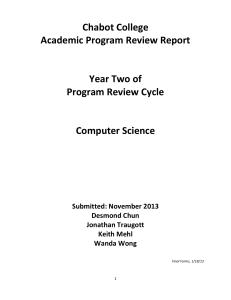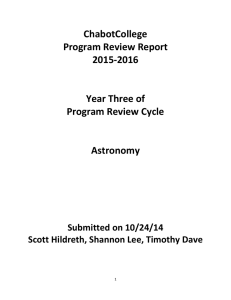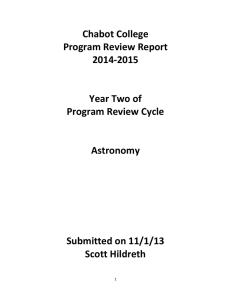Chabot College Program Review Report 2014 ‐2015
advertisement
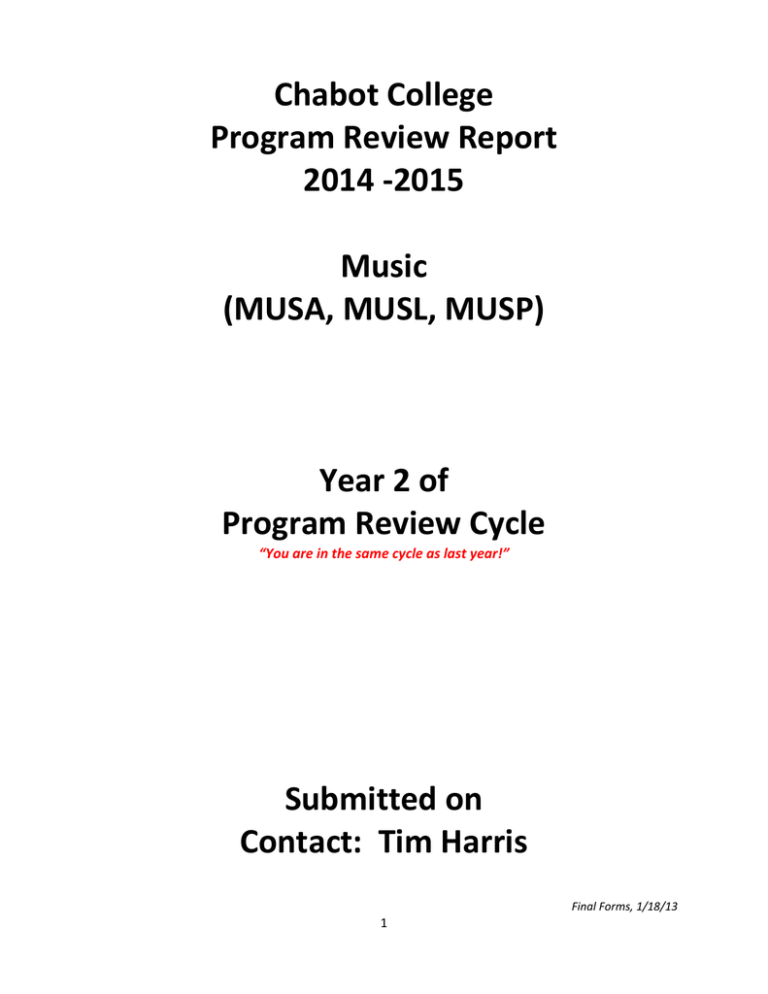
Chabot College Program Review Report 2014 ‐2015 Music (MUSA, MUSL, MUSP) Year 2 of Program Review Cycle “You are in the same cycle as last year!” Submitted on Contact: Tim Harris Final Forms, 1/18/13 1 Appendix B2: “Closing the Loop” Course‐Level Assessment Reflections. Course Semester assessment data gathered Number of sections offered in the semester Number of sections assessed Percentage of sections assessed Semester held “Closing the Loop” discussion Faculty members involved in “Closing the Loop” discussion Form Instructions: Complete a separate Appendix B2 form for each Course‐Level assessment reported in this Program Review. These courses should be listed in Appendix B1: Student Learning Outcomes Assessment Reporting Schedule. Part I: CLO Data Reporting. For each CLO, obtain Class Achievement data in aggregate for all sections assessed in eLumen. Part II: CLO Reflections. Based on student success reported in Part I, reflect on the individual CLO. Part III: Course Reflection. In reviewing all the CLOs and your findings, reflect on the course as a whole. PART I: COURSE‐LEVEL OUTCOMES – DATA RESULTS (CLO) 1: (CLO) 2: (CLO) 3: (CLO) 4: Actual Scores** (eLumen data) Defined Target Scores* (CLO Goal) CONSIDER THE COURSE‐LEVEL OUTCOMES INDIVIDUALLY (THE NUMBER OF CLOS WILL DIFFER BY COURSE) If more CLOs are listed for the course, add another row to the table. * Defined Target Scores: What scores in eLumen from your students would indicate success for this CLO? (Example: 75% of the class scored either 3 or 4) **Actual scores: What is the actual percent of students that meet defined target based on the eLumen data collected in this assessment cycle? 2 PART II: COURSE‐ LEVEL OUTCOME REFLECTIONS A. COURSE‐LEVEL OUTCOME (CLO) 1: 1. How do your current scores match with your above target for student success in this course level outcome? 2. Reflection: Based on the data gathered, and considering your teaching experiences and your discussions with other faculty, what reflections and insights do you have? B. COURSE‐LEVEL OUTCOME (CLO) 2: 1. How do your current scores match with your above target for student success in this course level outcome? 2. Reflection: Based on the data gathered, and considering your teaching experiences and your discussions with other faculty, what reflections and insights do you have? 3 C. COURSE‐LEVEL OUTCOME (CLO) 3: 1. How do your current scores match with your above target for student success in this course level outcome? 2. Reflection: Based on the data gathered, and considering your teaching experiences and your discussions with other faculty, what reflections and insights do you have? D. COURSE‐LEVEL OUTCOME (CLO) 4: 1. How do your current scores match with your above target for student success in this course level outcome? 2. Reflection: Based on the data gathered, and considering your teaching experiences and your discussions with other faculty, what reflections and insights do you have? E. COURSE‐LEVEL OUTCOME (CLO) 5: ADD IF NEEDED. 4 PART III: COURSE REFLECTIONS AND FUTURE PLANS 1. What changes were made to your course based on the previous assessment cycle, the prior Closing the Loop reflections and other faculty discussions? 2. Based on the current assessment and reflections, what course‐level and programmatic strengths have the assessment reflections revealed? What actions has your discipline determined might be taken as a result of your reflections, discussions, and insights? 3. What is the nature of the planned actions (please check all that apply)? Curricular Pedagogical Resource based Change to CLO or rubric Change to assessment methods Other:_________________________________________________________________ 5 Appendix C: Program Learning Outcomes Considering your feedback, findings, and/or information that has arisen from the course level discussions, please reflect on each of your Program Level Outcomes. Program: _MUSIC (AA)_______________________________________________ PLO #1: Demonstrate developmentally appropriate proficiency of instrumental/vocal performance on an individual and ensemble level. PLO #2: PLO #3: PLO #4: What questions or investigations arose as a result of these reflections or discussions? Explain: As mentioned above, the importance of applied music courses. What program‐level strengths have the assessment reflections revealed? Strengths revealed: The quality of our applied music instruction and our comprehensive ensemble course offerings. What actions has your discipline determined might be taken to enhance the learning of students completing your program? Actions planned: To clearly set goals and benchmarks for applied music study in our department handbook and to get as many students as possible participating and enrolled in applied music courses. 6
